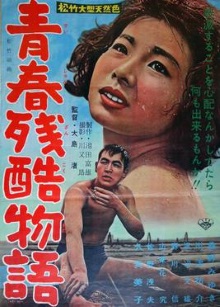
So our cinephile friend dropped off a whole load of films recently and we basically decided to watch whatever he gave us though it’ll take us a long while to get through all of them. This was one pick that we would never have watched ordinarily, a film about youth rebellion from 1960s Japan. Apart from the fact that it’s Japanese however, I didn’t find it that remarkable.
Makoto Shinjo and her friend hitchhike home from school one evening, despite being warned that only bad girls do so. After dropping off her friend, the middle-aged driver attempts to molest her. A boy Kiyoshi Fuji notices and fights him off. The next day they go on a date which ends with the boy raping her. She ends up falling in love with him after he fights off gangsters who were targeting her for prostitution. When her elder sister Yuki scolds her about their relationship, she runs away from home to move in with Kiyoshi. In order to earn money, they reenact the scenario under which they met. Makoto would lure middle-aged men while Kiyoshi would follow and take action when they molest her so that they can extort money out of the men. Soon enough Makoto becomes pregnant and the couple get in trouble with the law due to their activities.
So this is obviously a scenario that we’re familiar with from Western films and Wikipedia tells me that it’s a deliberate attempt by the Japanese to emulate the work of the French New Wave. In particular it’s easy to notice parallels between this film and Jean-Luc Godard’s Breathless. I feel however that it doesn’t quite capture the spirit of its inspiration and ends up perverting it in quite a different direction. Sure it’s street-level, unglamorous view of life is pure New Wave as is its subject matter of youths rebelling against society. Though even in the Western films, such stories always end tragically for the protagonists, there’s also a sort of noble, even heroic, quality to their nihilistic tragedy. This quality is absent here and the tone is moralizing right from the start. Makoto is a profoundly stupid girl for getting involved with someone like Kiyoshi and there is nothing romantic or beautiful about their relationship at all. I suppose it does feel very Japanese to grasp that rebellious spirit of youth and thoroughly squash it until nothing is left.
Even allowing for the different culture and the period, I was still shocked by how deeply misogynist this film is. It’s not just the characters, the film itself is deeply prejudicial against women who are portrayed as being easily victimized due to their weakness and neediness. There are references that I don’t understand as the events take place against a backdrop of protests against a treaty between Japan and the US that I believe was seen as being humiliating. The film also serves as a good reminder that Japan was not all that rich in the early 1960s. Kiyoshi’s room is squalid and Makoto’s family house is fairly modest as well. It makes for an interesting portrayal of Japan that we don’t often see.
Bold as this film must have been for its time, I don’t think it has enough going for it to make it worth watching in the present. Making a film in the French New Wave style only to reinforce the existing Japanese social norms rather than break barriers seems quixotic to me. The whole thing even feels somewhat like a 1960s American sexploitation film without the spunk or classiness. I can’t recommend this one at all.